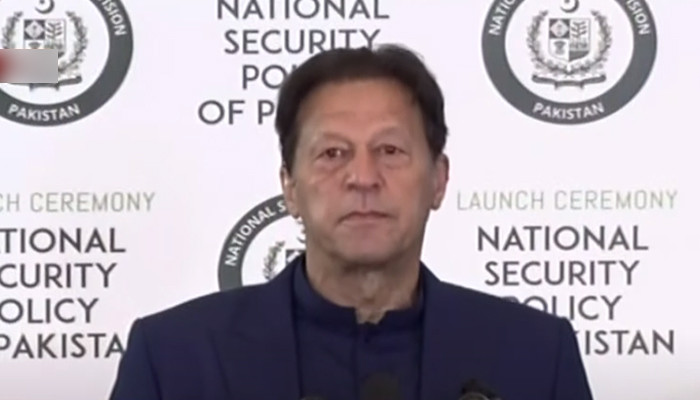
By Sher Bano 28 January 2022
On January 14th, 2022, Prime Minister Imran Khan launched the public version of the Pakistan’s first ever National Security Policy 2022-2026. He was of the view that now the country is headed towards the right direction. Earlier only one-dimensional mindset prevailed in the country that Pakistan only needs military security, but the new security policy has defined the term ‘security’ in the right manner. It wants to co-locate Pakistan in evolving global trends by identifying the priorities and objectives of the policy under a foreseeable and prevalent regional and global environment.
The National Security Policy has recognized both non-traditional and traditional aspects of the security or threats. However, the core of comprehensive national security is ‘economic security’ that any policy framework that is environment savvy would have done. The purpose is not to replace geopolitics by geo-economics but has insisted upon the complementing roles of both. It indicates that the stronger economy would result in a robust security by allotting more resources to defence and national security. The NSP appreciates the symbiotic relationship among traditional, human and economic security in an emerging environment that contains various centers of military and economic power within the contemperory global landscape that is moving towards multipolarity. It also recognizes Pakistan’s proximity to global flashpoints, its geostrategic location, global competition which is something considered as our negative relevance to the global and regional power construct. The policy stresses upon looking forward approach and proactivity of the policy makers of the state. The policy would be a success if there are actionable steps that remain in step with the evolving global environment, improving our internal security, external relations and bringing societal harmony within the state.
However, the public version of the NSP does not provide details regarding the specifics of foreseeable and prevalent global, regional and domestic security environment; National interest of Pakistan and the framework to protect them. Various other policies such as economic policy, internal policy, defence policy and foreign policy etc. would also be extracted from the mother document and would contain greater detail. This policy document provides an insight into the country’s national security overall direction and vision. There is greater hope that the civil-military collaboration through which this document has been created would have used rigorous approach in classifying the hierarchy of National purpose e.g., objectives, aims, interests etc. that NDU has been teaching to the generations of policy makers.
Following are some the important takeaways from the document; Section I of the NSP is about the process and the periodic review of NSP. The Section II explains in detail the concept, vision and principles of the National Security Policy for its successful implementation. There are six thematic sections followed by Section II. In the Section III policy guidelines and opportunities for national cohesion were identified. The details regarding securing the economic future of Pakistan by identifying opportunities and challenges were provided in Section IV. Defence and territorial integrity was discussed is Section V whereas Section VI deals with the internal security of the state. Foreign policy of Pakistan in emerging global framework was provided a huge space in Section VII. The last Section VIII was devoted to the human security.
The policy document reiterates that Pakistan would ensure its deterrence, defence, space and cyber-security and territorial integrity at all costs. It would defend any sort of aggression through FSD (Full Spectrum Deterrence) that also CSD (Credible Minimum Deterrence) without indulging in any arms race. This robust policy framework talks more openly about both non-conventional and conventional means of deterring the enemy. It also emphasizes upon promoting Positive reality of Pakistan. It reiterates that only vital interest of Pakistan is peaceful resolution of the Kashmir dispute. Furthermore, it stresses upon Pakistan’s economic ties and mutual cooperation with the GCC. It also focuses on building stronger relation with US though cooperation in trade, investment, counter-terrorism, intelligence cooperation and security and leaving behind the camp politics.
Overall, it is a very impressive document that covers various aspects of Pakistan’s National Security. NSD (National Security Division) should be given the credit for putting something that was understood on a piece of paper in the form of official policy. It would prove to be an engine to move forward and for putting thoughts into action. It would be stimulating to see the operationalization of the policies presented in NSP-1.
The writer is working as a Research Affiliate at the Strategic Vision Institute (SVI), a non-partisan think-tank based out of Islamabad, Pakistan.



0 Comments
LEAVE A COMMENT
Your email address will not be published